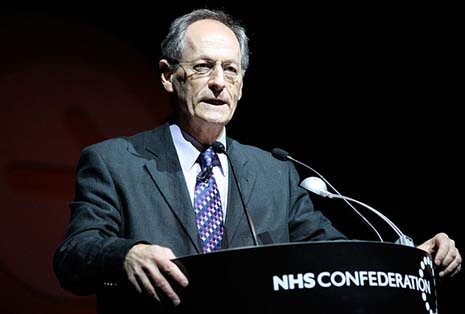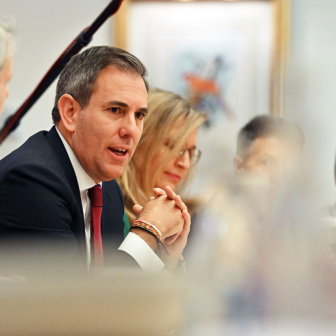It’s a story that wouldn’t normally make the headlines. A middle-aged man in a central Queensland town found himself stacking on a lot of weight unusually quickly. His blood pressure was on the rise, and he struggled to get a good night’s sleep. His diagnosis, diabetes, is far from rare, and the common explanation, “unhealthy lifestyle choices,” threw the responsibility back on the sufferer.
But this is not how Dr Ewen McPhee sees it. His patient’s plight is symptomatic, he believes, of wider social, environmental and economic forces affecting the health of members of his community in Emerald, an agricultural and coal-mining centre on the Nogoa River. McPhee traces his patient’s deteriorating health back to when he moved from an active job at a local mine into a supervisory position involving long, stressful hours.
“The high expectations of performance, and uncertainty about his employment security have led to chronic, pervasive fatigue, low mood and anxiety,” he says. “He has little time for hobbies, interests, family, friends, and his drinking has increased.” From McPhee’s vantage point, the man seems to have little power not only over his destiny but also over his health. He is at the mercy of what McPhee calls “unrealistic employer expectations and an embedded culture of the employee being another cog in the wheel of production,” as well as a lack of social networks and support.
With so much of our public debate about health framed narrowly by lifestyle and access to hospitals, McPhee is pleased to see an increasing push – at the recent National Rural Health Conference in Adelaide, for instance – to tackle some of the underlying factors that affect the health of communities and individuals. These “social determinants of health” are defined by the World Health Organization as the “conditions in which people are born, grow, live, work and age, including the health system.” According to WHO, they are the major contributor to the inequitable, and avoidable, differences in health to be found within and between countries.
Five years after a landmark report by WHO’s Commission on Social Determinants of Health, Closing the Gap in a Generation, called for systematic action by governments, Australia is finally taking the issue seriously. A Senate report released in March recommended that the federal government adopt the WHO report’s recommendations and commit itself to taking account of health’s social determinants in all relevant policy areas, including education, employment, housing, and family and social security policy.
The inquiry also recommended that one agency be charged with making sure that social determinants of health are taken into account across government departments, and with providing progress reports to parliament each year. The “pre-eminent idea” put to the committee was for the Commonwealth to adopt a similar mechanism to South Australia’s Health in All Policies approach.
Fran Baum, professor of public health at Flinders University in Adelaide and a member of the WHO commission, welcomes the inquiry’s recommendations, including its plan for the National Health and Medical Research Council, or NHMRC, to give priority to funding research into public health and social determinants. “Currently the NHMRC overwhelmingly funds the ‘M’ in its title, the medical research,” says Baum, “and hardly any of its budget is directed to determining how we can keep people well and foster well-being.”
WHILE some states – notably South Australia and Tasmania – are already attempting to address the underlying causes of poor health, there are many barriers to wider action. As the WHO report makes clear, working on this broader front means tackling “the inequitable distribution of power, money and resources,” which is no easy task.
Tellingly, very few submissions to the Senate inquiry came from outside the health sector. This suggests that other vital areas – such as education, social policy and employment – are not engaging with this cross-sectoral approach to improving people’s health. Even within the health sector, there are formidable barriers – including, according to the Senate report, the federal government’s own Department of Health and Ageing, or DoHA.
The report says that DoHA gives scant recognition to social determinants in its annual reports and appearances at Senate Estimates hearings, and tends to concentrate on the role of the health system, narrowly defined, in improving health, rather than considering the wider issues identified by the WHO commission. The department worries that focusing on social determinants may dilute support for existing health programs and services.
Nor are agencies that might be well placed to tackle social determinants, such as the Australian National Preventive Health Agency, or ANPHA, and the Australian Social Inclusion Board, doing enough, suggests the Senate report. Among the critics who say that ANPHA is too narrowly focused is the HealthWest Partnership, a primary care organisation in Melbourne. “The current focus of programs on changing individuals’ behaviours is equivalent to teaching people to swim to prevent Titanic-like disasters,” says HealthWest. “It is a limited and inadequate response.”
There’s no shortage of evidence to suggest that the health impact of government policies is not routinely considered. For example, the federal government’s Energy White Paper 2012, which purports to be a whole-of-government approach to policy, has virtually no focus on health beyond occupational health and safety concerns. Yet energy policy is a major area of concern globally for public health.
Even health ministers struggle to come to grips with the social determinants of health. A new study by Baum and her colleagues, based on interviews with twenty former federal, state and territory health ministers, suggests that in a crowded policy area dominated by hospitals and the medical lobby, there is little impetus or scope for them to do so.
The study, to be published in the journal Social Science & Medicine, quotes one former minister: “One of the things I came to realise very early was that you had to have a reasonable degree of satisfaction with your hospital services before you could get too far with constructing a social health strategy that encompassed community health, public health, let alone affordable housing and accessible education. You had to be able to demonstrate that the hospital system was functional.”
On top of that, the researchers say, the relatively complex social determinants agenda is forced to compete for attention with problems that seem more straightforward. And so far, few powerful “policy entrepreneurs” have emerged to advocate for action in this area.
All of this means that the recent launch of the Social Determinants of Health Alliance, representing organisations from health, social services and public policy, might prove a game-changer. Catholic Health Australia was instrumental in setting up the alliance, and its director of strategic policy, Liz Callaghan, is hopeful that the time is right for action, particularly given the cross-party sign-off on the Senate report.
While neither the government nor the Coalition has yet formally responded to the report, Callaghan says DoHA is watching closely and will respond “if there is enough of a momentum for change.” Despite the Coalition’s weakness for slogans about “class warfare” and opposition leader Tony Abbott’s view of health as primarily a matter of personal responsibility and individual choices, Callaghan thinks the social determinants agenda could be attractive for a conservative government.
She says it would help to streamline government funding and reduce duplication of funding across portfolios, as well as boosting productivity. Two key factors – coordination and accountability – need not involve any cost to government, she adds.
For those who might see this optimism as wishful thinking, particularly given the recent public health cutbacks by many state governments, it’s worth noting that Martin Laverty, the Catholic Health Australia CEO who has advocated strongly for action on the social determinants and health inequalities, is well connected in conservative circles, being a former NSW director of the Liberal Party. And, as one of the field’s international leaders, Sir Michael Marmot, pointed out during a visit to Australia last year, some conservative governments and politicians – including London’s mayor, Boris Johnson – have been supportive of the agenda.
BUT perhaps the major barrier lies in the kind of health story that dominates the headlines, often reflecting the power of the medical lobby and acute care services, as well as the “lifestyle choices” meme. The chronic health effects of racism, for example, will never command the media attention reserved for hospital waiting lists or medical “breakthroughs.”
A shift may be occurring, however, amplified by the level of support on channels like Twitter for action on the social determinants. It was thanks to Twitter that I learnt about a recent report, Working for Health Equity, from Marmot and colleagues at the Institute of Health Equity at University College London, that looks at how health and medical professionals can tackle the social determinants of health, which it says should be a “a core part” of their work.
Marmot says the medical and health professions make “trusted, expert, committed, and great powerful advocates.” Back in Emerald, Ewen McPhee – immediate past president of the Rural Doctors Association of Queensland – is ready to lend his professional clout to the social determinants agenda. During the recent rural health conference, he engaged long-distance in related conference discussions via Twitter.
His close connections to community provide powerful insights for translating the obscuring jargon of “social determinants” into real-world stories. For McPhee, it is not a dry academic concept but something whose impact he sees every day – in high prices of fresh produce and in the struggles of young parents to provide for their children as rents skyrocket, as they have in so many mining towns.
He also thinks of the depressed patient who recently lost his cotton farm after crops failed and prices collapsed, of patients harmed by industrial accidents due to unsafe workplaces, and of the young child whose failure to thrive reflects her mother’s social and economic disadvantage.
“The effect of the radical changes in Queensland public service employment has been devastating for many of my patients, previously employed by local service departments, and a sad reflection on high-level management of change processes,” says McPhee. “The recurrent weather events and serial floods in the Central Highlands have left a hidden devastation in their wake. I see people with depression, anxiety and stress almost daily; even now, three years after the last major event.”
Often McPhee feels he is prescribing medicines to try to fix underlying social and economic ills. “Every day as I start consulting I reflect on how, as a clinician, I extoll the virtues of prescription drugs to rescue people from the ravages of illness that are largely the result of environmental factors,” he says. “In my community, diabetes, cardiovascular disease and chronic renal failure are so common as to not raise any eyebrows, when we should be thinking more deeply of their origins.”
McPhee argues that improving the education of parents in healthy food choices, promoting early and comprehensive postnatal care of newborns and providing society-wide access to quality education are more likely to produce significant cost and health benefits “than any amount of medication.”
Demands for more doctors, nurses and other health professionals should, he says, be balanced by pressure for “equity of access to healthy food, early childhood support, educational opportunities, affordable housing and community infrastructure to support social integration.”
When medical leaders are prepared to speak up like this, perhaps it’s a sign that politicians and policy-makers will come under increasing pressure to tackle the broader forces that shape our health and well-being. •
Declaration: Melissa Sweet contributed a chapter to a 2011 book edited by Martin Laverty and Liz Callaghan, Determining the Future: A Fair Go and Health for All.




